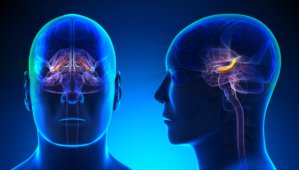Lack of vitamin D damages the structure and health of your brain
 Scientists from Queensland in Australia have discovered that vitamin D is of vital importance to the structure and health of the brain. Also, deficiencies of the nutrient may lead to dysfunctions and loss of cognitive skills plus depression and schizophrenia. More than one billion people worldwide are believed to lack vitamin D. This may have widespread consequences for their health and may even be linked to the huge increase in mental illnesses.
Scientists from Queensland in Australia have discovered that vitamin D is of vital importance to the structure and health of the brain. Also, deficiencies of the nutrient may lead to dysfunctions and loss of cognitive skills plus depression and schizophrenia. More than one billion people worldwide are believed to lack vitamin D. This may have widespread consequences for their health and may even be linked to the huge increase in mental illnesses.
All cells in the body have vitamin D receptors, including brain cells (or neurons), and researchers from the University of Queensland are now one step closer to understanding how vitamin D affects the structure and function of the brain. According to Professor Thomas Burne, who headed the new study, there is already an established connection between vitamin D deficiency and impaired cognitive skills. However, it is not fully understood how vitamin D affects the structure and function of the brain, and why lacking this essential nutrient can cause so many problems.
Vitamin D affects the protective network of the brain
Professor Burne and his team of scientists found that vitamin D affects certain networks in the brain that are known as perineuronal networks. These networks represent a strong and supportive structure around certain neurons. That way, the networks stabilize the contact between these and other neurons. In their study, the scientists used healthy, adult mice that were fed a vitamin D-depleted diet. Just for the record, the liver stores vitamin D, but this reserve had gradually been emptied in the mice.
Lack of vitamin D leaves neurons vulnerable and ineffective
After 20 weeks, the scientists observed that vitamin-deficient mice performed significantly worse in memory and learning tests, compared with a group of control mice.
Burne and his colleagues also found that vitamin D-deficient mice showed signs of a substantially reduced perineuronal network in the hippocampus, which is the part of the brain that is responsible for memory and orientation. The number of connections between the neurons in this partof the brain was heavily reduced, and so was their signal strength.
According to Burne, vitamin D plays a vital role in terms of developing and stabilizing the perineuronal network, but if levels of vitamin D drop, the network becomes more vulnerable to enzymatic breakdown.
It also turns out that the neurons in the hippocampus are particular vulnerable, and if they lose their support in the perineuronal network, it becomes difficult for them to maintain their connection with other neurons. This may lead to a loss of cognitive functions.
Professor Burne also says that loss of functions in the hippocampus plays a role in the onset of impaired memory and schizophrenia. Moreover, hippocampus is among the parts of the brain where changes are first seen in connection with Alzheimer’s disease.
|
The hippocampus is like the canary down the mine shaft
The reason why the hippocampus is so vulnerable to vitamin D deficiency, Burne explains, is that this region is more active and sensitive than other parts of the brain. Burne likens the hippocampus to the overactive and sensitive canary bird that used to serve as a red flag warning in the coalmines, simply because it would drop dead as the first living creature in case of a toxic gas leak. The new study also demonstrates that the hippocampus in the right side of the brain is more sensitive to a vitamin D deficiency than the hippocampus in the left side.
Vitamin D’s potential in the prevention and novel therapy
Burne and his team of scientist also discovered that the perineuronal network in the brain can change in adult mice. This means that there is a potential for restructuring the networks, thereby creating a new foundation for therapies aimed at depression, schizophrenia, and other diseases, where the neurons malfunction because of too little vitamin D. According to Burne, the next step is to test the hypothesis that deals with the link between vitamin D deficiency, the perineuronal network, and the cognitive skills.
Their research is published in the science journal Brain Structure and Function and Trends in Neuroscience.
How to get enough vitamin D
The best source of vitamin D is the sun during the summer period. The diet only provides a limited amount of the nutrient.
The officially recommended intake level for vitamin D in the United States is 15 micrograms daily, but many scientists believe that we need a lot more to cover our needs. Our need for vitamin D also hinges on factors such as sun exposure, age, skin type, BMI, and chronic diseases like diabetes. Vitamin D is a lipid-soluble nutrient, so it is best to take capsules with vitamin D dissolved in oil.
Vitamin D deficiency and poor utilization of the nutrient may be caused by
|
References
Mamun Al-Amin et al. Adult vitamin D deficiency disrupts hippocampal-dependent learning and structural brain connectivity in BALB/c mice. Brain Structure and Function. 2019
University of Queensland. Potential link between vitamin D deficiency and loss of brain plasticity. Neuroscience. News.com
https://da.wikipedia.org/wiki/Hippocampus
https://www.sst.dk/da/sundhed-og-livsstil/ernaering/d-vitamin
Search for more information...
- Created on .








